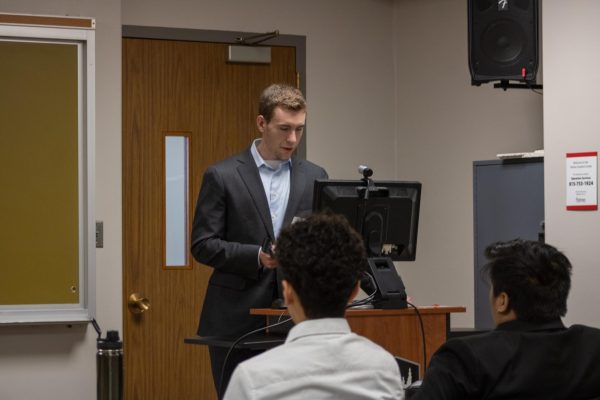ROTC under new leader
November 17, 2004
NIU students interested in majoring in military science in the future may notice some big changes in the program compared to previous years.
This is due in large part to a new chair in the department, Lt. Col. Craig Engel. Engel, who transferred to NIU in May of last year and replaced Lt. Col. Steve Payne after he retired, is already hard at work in his first semester.
Engel began his history with ROTC when he graduated in 1985 from the military science program at the University of Wisconsin at Oshkosh. His job at NIU entails training cadets to become lieutenants and recruiting new students for the military science program.
“I transferred here from Camp Parks, California,” Engel said. “I grew up in the Midwest, so I was excited when I was chosen for NIU.”
One of the first things Engel did when he arrived was completely rewrite the cadet handbook, which changed from a 30-page manual to a 250-page document. Even though it was a huge challenge, Engel said, it had to be done.
“There were standards that had declined,” he said. “I helped to re-establish Army standards.”
Engel is now enjoying the fruits of his labor. He said that retention rates among new recruits are up 40 percent. He also attributes the program’s newfound success to a stricter regimen for new recruits.
“When I first got here, 30 percent of basic course cadets participated in general training,” Engel said. “Now, 80 percent participate. It shows cadets are excited.”
Engel said he enjoys working with the ROTC program because he gets to influence students’ leadership skills.
“My whole career has been working with soldiers,” he said. “I know how important good leaders are.”
Although the program currently has only about 80 undergraduate cadets, Engel says he has big plans for the program in the future.
“I’d really like to see it grow,” he said. “We do that by getting cadets excited. The changes that we just made in the program will get more people involved.”
Engel says it’s important for students to get involved in military science because it develops leadership skills and fulfills a duty to one’s country.
“It’s interesting how the program has changed,” he said. “These days, we need to be fast-thinking leaders and it wasn’t like that 20 years ago.”












